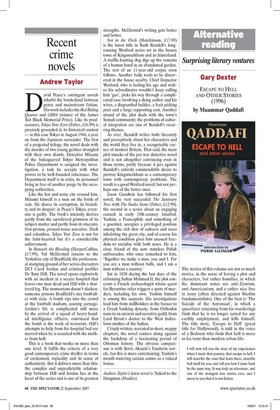Recent crime novels
Andrew Taylor David Peace's astringent novels inhabit the borderland between genre and mainstream fiction. His work includes the Red Riding Quartet and GB84 (winner of the James Tait Black Memorial Prize). Like its predecessors, Tokyo Year Zero (Faber, £16.99) is precisely grounded in its historical context — in this case Tokyo in August 1946, a year on from the Japanese surrender. The first of a projected trilogy, the novel deals with the murder of two young geishas strangled with their own shawls. Detective Minami of the beleaguered Tokyo Metropolitan Police Department is assigned the investigation, a task he accepts with what proves to be well-founded reluctance. The Department itself is in crisis, its personnel living in fear of another purge by the occupying authorities.
Like the hot and noisy city around him, Minami himself is a man on the brink of ruin. He shares its corruption, its brutality and its despair: in Peace's Tokyo, everyone is guilty. The book's intensity derives partly from the unrelieved grimness of its subject-matter and partly from its staccato, first-person, present-tense narrative. Dark and relentless, Tokyo Year Zero is not for the faint-hearted but it's a considerable achievement.
In Beneath the Bleeding (HarperCollins, £17.99), Val McDermid returns to the Yorkshire city of Bradfield, the professional stamping ground of her series characters DCI Carol Jordan and criminal profiler Dr Tony Hill. The novel opens explosively with an incident at a secure hospital that leaves one man dead and Hill with a shattered leg. The momentum doesn't slacken: someone poisons Bradfield's star footballer with ricin. A bomb rips into the crowd at the football stadium, causing carnage. Jordan's life is complicated still more by the arrival of a squad of heavy-handed intelligence officers, convinced that the bomb is the work of terrorists. Hill's attempts to help from his hospital bed are marred when he is reunited with the mother from hell.
This is a book that works on more than one level. It fulfils the criteria of a very good contemporary crime thriller in terms of excitement, topicality and its sense of authenticity. But it delivers more than this: the complex and unpredictable relationship between Hill and Jordan lies at the heart of the series and is one of its greatest strengths. McDermid's writing gets better and better.
Not in the Flesh (Hutchinson, £17.99) is the latest title in Ruth Rendell's longrunning Wexford series set in the Sussex town of Kingsmarkham and its hinterland. A truffle-hunting dog digs up the remains of a human hand in an abandoned garden. The rest of an 11-year-old corpse soon follows. Another body waits to be discovered in the house nearby. Chief Inspector Wexford, who is feeling his age and wishes his subordinates wouldn't keep calling him `guy', picks his way through a complicated case involving a dying author and his wives, a disgruntled builder, a fruit-picking poet and a large supporting cast. Another strand of the plot deals with the town's Somali community; the problems of cultural integration are one of Rendell's recurring themes.
As ever, Rendell writes both literately and perceptively about her characters and the world they live in, a recognisable corner of modern Britain. That said, the main plot smacks of the pre-war detective novel and is not altogether convincing even in those terms, partly because it jars against Rendell's entirely commendable desire to portray Kingsmarkham as a contemporary town with contemporary problems. The result is a good Wexford novel, but not perhaps one of the better ones.
Jason Goodwin has followed his first novel, the very successful The Janissaly Tree, with The Snake Stone (Faber, £12.99), the second in a series about an engaging eunuch in early 19th-century Istanbul. Yashim, a Francophile and something of a gourmet, occupies a privileged position among the rich slew of cultures and races inhabiting the great city, and of course his physical condition gives him unusual freedom to socialise with both sexes. He is a close friend of the now stateless Polish ambassador, who once remarked to him, 'Together we make a man, you and I. For you are a man without balls, and I am a man without a country.'
Set in 1838 during the last days of the reforming Sultan Mahmud II, the plot concerns a French archaeologist whose quest for Byzantine relics triggers a spate of murders, including his own. Yashim himself is among the suspects. His investigations lead him from stallholders in the bazaar to a Greek banking dynasty, from Orthodox nuns to an ancient and secretive guild, from Lord Byron's doctor to the West Indiesborn mother of the Sultan.
Crisply written, narrated in short, snappy chapters, the novel canters along against the backdrop of a fascinating period of Ottoman history. The obvious comparison is with Boris Akunin's Fandorin novels, but this is more entertaining; Yashim's mouth-watering cuisine comes as a valued bonus.
Andrew Taylor's latest novel is Naked to the Hangman (Hodder).

































































 Previous page
Previous page